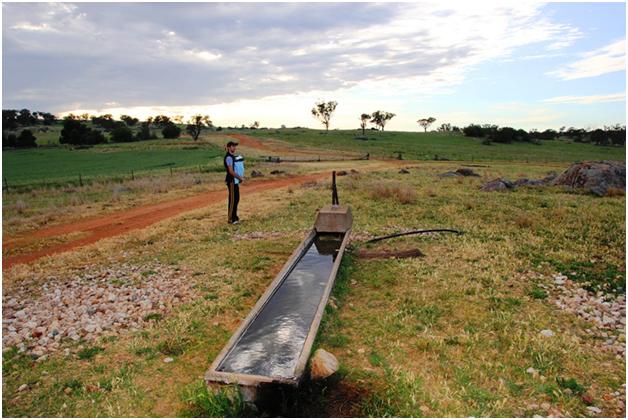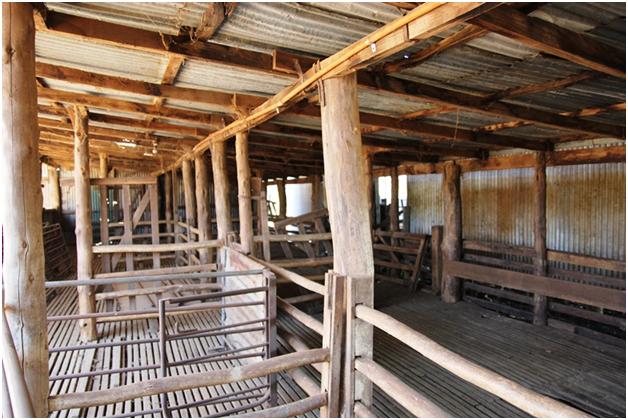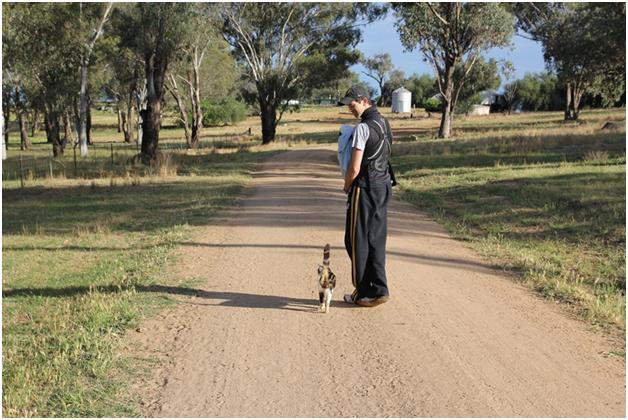Young, at Heart
Young, is actually quite old. Well by the standard of Australian country towns anyway, dating as it does from the mid-1820’s when the district was first settled as a sheep grazing area, although the aboriginal Wirajuri people had already been there for centuries. Back then, the new settlers named it Lambing Flat, a name subsequently associated with the discovery of rich goldfields in the 1860’s and the 1861 anti-Chinese race riots which led to the imposition of restrictive immigration laws to limit Chinese entry to the colony of New South Wales (NSW). It has been Young, named after a former NSW Governor, since 1863. Renowned as a well-laid out town in the middle of particularly rich farming land, the region supports both grain and livestock, especially the much-prized Merino sheep which provide some of the finest wool in the world. Just ask Italian and French fashion houses.
I had not spent much time in the Australian countryside for over a decade, and I had forgotten the sheer beauty of the broad vistas and the eye-hurting blue of the skies, the land in crop like dragoons of parade-ground soldiers in their myriad tints, the grey-green gums in the fields and beside the creek beds, like colour-sergeant sentinels. Fruit trees still held the bliss of blossom, the canola crop last week the shade of freshly churned butter, now a mere smattering of yellow flowers. My son and his wife had delivered to me a grandson whom I had returned from Bahrain to see, and while this was an attraction alone that brought me to Canberra, they had embellished it further by taking me to my daughter-in-law’s mother’s farm, outside Young. I was therefore, richly blessed on two accounts.
Young is an easy two hour drive from Canberra, along roads which soon wriggle through the magnificent roiling countryside, ladling out stunning views like Christmas presents. It was rural Australia at its best, fields green and fresh from bumper rains, dams brimming, the Spring air as clear as though a celestial lens polisher had been at work, my camera trembling with anticipation every time we stopped. I had a little grin each time I raised it to my eye, knowing the resultant photos would fill my friends in foreign lands with envy.
At the oh-so-typical country hotel in Boorowa, with its shady brim of a verandah like a drover’s hat, we ate a mandatory country steak in a cavernous dining room right off a saloon bar. There, many a thirst would have been slaked over the years, the mood both ribald and raucous with tales of sheep, and sheilas, sport and slackers.
“Welcome to paradise,” the publican greeted me warmly.
Somehow, mate in the country seems almost obligatory.
“A local are you, mate, born and bred?” I probed.
He beamed, “Hell no mate, I am a Kiwi, but not a dumb one. I came, and I stayed.”
Laconic comes easily out here, and the boys on barstools grinned. In my shorts and pink polo shirt, I stood out as a citified oldie as a donger on a dingo. I just grinned inanely and passed swiftly into the soft, lustrous night, joining my urban fellow-travellers, and let the full moon take the reins for the rest of our ride to Young. It was that sort of night.

There is always an explorer-like thrill when you turn off the black bitumen, especially at night, and on to a gravel side track and proceed into the darkness beyond, as though discovering a grotto, peering, and holding your lantern higher. The shadows of trees painted dark ogres on the whiteness of the track and in the fields nearby, there was the glint of watchers eyes, chamois-like shapes suggesting sheep. The rill of the cattle grids shivered the spine and I envisaged too, watching snakes, of which I have a mortal fear, and drew my feet up slightly. The brightly lit farmhouse on the hill, with its large French doors and plethora of curtain-less windows, had all the warmth and joy of a finally found nest.
There is too a heartiness about arriving at a country property that brings a special bonhomie. Maybe it's because such sojourns are somehow more meaningful than a simple suburban soiree to the house of an oft-seen friend. There is always the carting in of cases and copious cardboard cartons full of city things, cabernet and cookies, cameras and coats. And there is the unbridled joy of having ‘made it’ to a distant destination and the dispensing of darkness that but for brief moments, has kept you company. It was easy to settle in and my quarters, in a cottage tethered to the farmhouse by a raised roof, were as cozy and comfortable as any Connaught or Claridges. We drank tea and talked, and breathed in great scoops of country air. I was asleep in an instant.
Arabs suggest that one treasures the first hour of the morning, because it is an hour stolen from paradise. In the countryside, it is even truer. Here, the Creator comes with a full palette of pastels, soft pinks, mauves, and oranges, the creeks and dams glow like burnished copper and the pasture grasses, so still in the windless air, in minutes go from yellow to green by the hand of an alchemist, like a blond who has spent too long in a chlorinated pool. Flowers in their garden beds, all hooded and scented when we arrived last night, were now about faced, stretching somewhat, and awaiting a basting from the sun. Vaporous shapes from the night before, emerged as woolsheds and silos, the occasional long dead tree like a many-armed Indian god. And the silence all about us, fairly roared.
My son rapped at my window but it was hardly necessary, as I had long before been booted and clothed, he with my new grandson papoose-like on his chest, and together we set a path across the paddocks for a nearby hillock. From there, we could see the folds of the land all the way to the distant Weddin mountains, a mere purpled bump at the end of the landscape. A pauper cloud, replete with holes so bits of the sun shone through, came over us as a gentle mantle. There was no need for a watch, it was simply ‘early.’ Today, like the ancients, I would live and navigate by the sun, for time here had slipped its moorings. No wonder this place was called Young for I could feel the rejuvenation in the air, my eyes on vacation from the desert and the city, no sand, no grit, no grime, no polluting traffic.

We wandered past mealy mouthed sheep, blank looks on their faces, they staring back at us through huge unblinking eyes, and to a herd of cattle full of suspicion and aggressive intent in spite of our having no beef with them, but like Scott before the Pole, we turned back short of our objective. We wandered instead past sheds of various purpose, and saw a dozen motors stripped of refinements such as bonnets and mudguards, cars and trucks, tough, working hombres, looking like those fearsome tattooed men who roll up the sleeves of their short sleeved shirts to accentuate their muscles. Once they were new and gleaming road vehicles, now farm buggies, ready for bashing through the paddocks to inspect stock or return to the tractor simply parked in the bundu, when plowing stopped for the coming of the night. Keys in ignitions, ready to go. No one would steal a vehicle out here! And there too were plows and farm machinery, a crop header to harvest the grain, as huge as a warehouse with tyres as large as a roundabout, all computerized and air-conditioned and alone worth hundreds of thousands of dollars. Millions of dollars invested and so much dependent on sunshine and rain, but not too much of either. Drought, floods, pestilence, bushfires, the vagaries of prices, and despite mechanization and computers, still lots of hard work, or Hard Yakka as older Australians say. It makes for a fickle lifestyle.

We wandered past an old shearing shed full of crooked knobbly timbers, tree-trunks and branches with no fancy milling, but functional though I daresay unbearably hot in the height of summer under the corrugated iron roofing. Once here, the axe-man was a legend for cutting and shaping everything, fence-posts, beams, timber for houses, and farming equipment. Not always a big man, he was wiry and muscled, in shorts, big boots, and a blue stained singlet. The regular fall of the axe in the bush was like a drum beat, a pleasing, rhythmical welcoming sound. Here in the vacant bush was life. Now chain-saws have taken away all that romance.
The pungent although not unpleasant smell of sheep hung everywhere around the shearing shed, wisps of wool too, caught in corners, greasy to the feel, the lanolin a great skin balm and now sold in natty little pots to the ladies of leisure, to keep their limbs sweet smelling and supple. The shed was now as quiet as a Romney Presidential party, but soon it would have all the frenzy of the NY Stock Exchange, sheep bleating, dogs barking, shears buzzing, hooves beating a staccato on the wooden race, wool classers and ringers yelling, bailers grunting, all amid the flies, the dust, and the pong of poop and raw wool.

We headed back to the house on the hill, surrounded by its spread of trees like a monk’s pate, joined by a domestic cat from one of the many out-houses of the farm over-seers and hands. In the light, the dams, many hand dug by hardy men, were blessedly full of water, a nearby billabong too. How many times a day I wondered, would farmers eyes have turned skywards, perpetual Galileo’s, all of them, looking for load-bearing clouds, and in the right season, an almighty dump of rain. Great gouged gullies showed that when the rain came, it came in abundance and swelled the creeks, they wiggling ever lower to find a fat river, brown and frothy, full of waves and logs. But alas, much is given to perfidy, shades of grey that promised much, but simply passed on, leaving creeks to dry like a shriveled snake, leaving the ochre soil to harden like a skin when the serpent had long gone.
We walked past the tennis court, now a parched victim of the drought, the net rolled up and standing like a tombstone, yet I swore I could hear the plop of tennis balls. Two truckloads had brought water for the pool, a luxury compared to swimming in a muddy dam. The garden too looked verdant, full of herbs and vegetables, for the roots of self-sufficiency here run deep, but also flowers, resilient roses and creepers, wisteria and jasmine, that link with civilization that every farmer’s wife cherishes like a diamond. For when it is no longer possible to water even a tiny garden, it is time to leave the land.
I had a bush shower; get wet, turn shower off, soap up, shower self down – quickly, all in two minutes, max! A hearty breakfast awaited us, one good for guts and girth, and then after breakfast, we gathered around the piano, the women playing sonatas, Chopsticks, and boogie-woogie amid lots of laughter. I could imagine many dinner parties ending around the piano before people went to the various bedrooms and sleep-outs, for in the ‘old days,’ given the distance needed to get here, provision of accommodation was mandatory.
In mid-morning, we travelled the thirty kilometres to Young and went first of all to the Lambing Flat Chinese Tribute Gardens, a beautifully tranquil symbol to reconciliation at the site of the once divisory Chinaman’s Dam. We went in to town to lunch at an old brick school which could have been mine, albeit that I grew up on the other side of the continent. Fittingly the school was now the local museum with the infamous Roll Up, No Chinese, Roll Up banner on display, and the story of the riots. It was chocka-ful of ‘old things’ which took me back to the 1950s and gladdened my heart; single bar heaters, wringers and coppers, and the school desks like the ones I once had. I simply wallowed in nostalgia.

The symbol of Young and the old railway station, now a tourist centre
Young is still the “Cherry capital of Australia” since the mid Eighteenth century when an enterprising Austrian immigrant created the first cherry orchard and with the coming of the railway, expanded his operations and sent daily supplies to Sydney. Now in spring, Young simply blossoms, and hosts an annual cherry festival. The town itself has a grid of broad streets, wide enough in which to turn a bullock team, and at various locations along the streets there are simple displays of how it looked from photos taken over a hundred years ago. It was full of grand hotels, a number ringing the 1884 Temperance Hall, fine granite churches, the obligatory Mechanics Institute, the imposing 1886 District Courthouse with its Grecian columns, and a former Emporium which was once the ant’s pants of retail with sections devoted to Haberdashery, Manchester and Ironmongery. There were flour mills, sturdy banks and a 1920’s Fire Station, still in use. Young, in 1889, was the first non-metropolitan town in NSW to have electricity installed for public and private use. An obelisk and a Memorial Wall in the lovely Anderson Park show how many men from the Young district went off to fight in both World Wars. Today, over 7,000 people call Young home, and aside from crop or beastie farming, local wineries are now proliferating.
I am happy that the Australia I grew up in revered ‘the bush,’ and that it remains embedded in our psyche, even though we are the most urbanized nation on earth with ninety percent of the population living along the coastal littoral. I am not sure that today’s Australians accord it that same awe. Distances are easier to cover, communications are better, facilities more comforting and the bush has lost much of its fears. The bush poets and writers who sat around campfires and wrote of the harshness and splendour of the countryside, have left their legacies in words that my generation still know by heart and recall at times with a teary eye, of that Australia when we were young.

We drove back to Canberra all too soon, through Wombat, Harden, Yass and Murrumbateman, towns with character aplenty. Soon the land would be yellow and brown again. I recalled the lines of a poem by a young Australian poet, Dorothea Mackeller, who in 1904 captured the essence of a different Australia, yet one you still found in old country towns like Young. She named it Call of my Heart, but we knew it simply as, My Country.
I love a sunburnt country, a land of sweeping plains
Of ragged mountain ranges, of droughts and flooding rains
I love her far horizons, I love her jewel sea
Her beauty and her terror, the wide brown land for me
Though Earth has many splendours, wherever I may die
I know to what brown country, my homing thoughts will fly.
Green made me feel Young at heart, but I’m sure it is just as beautiful when its brown!
Winfred Peppinck is the Tales of the Traveling Editor for Wandering Educators
All photos courtesy and copyright Winfred Peppinck



















